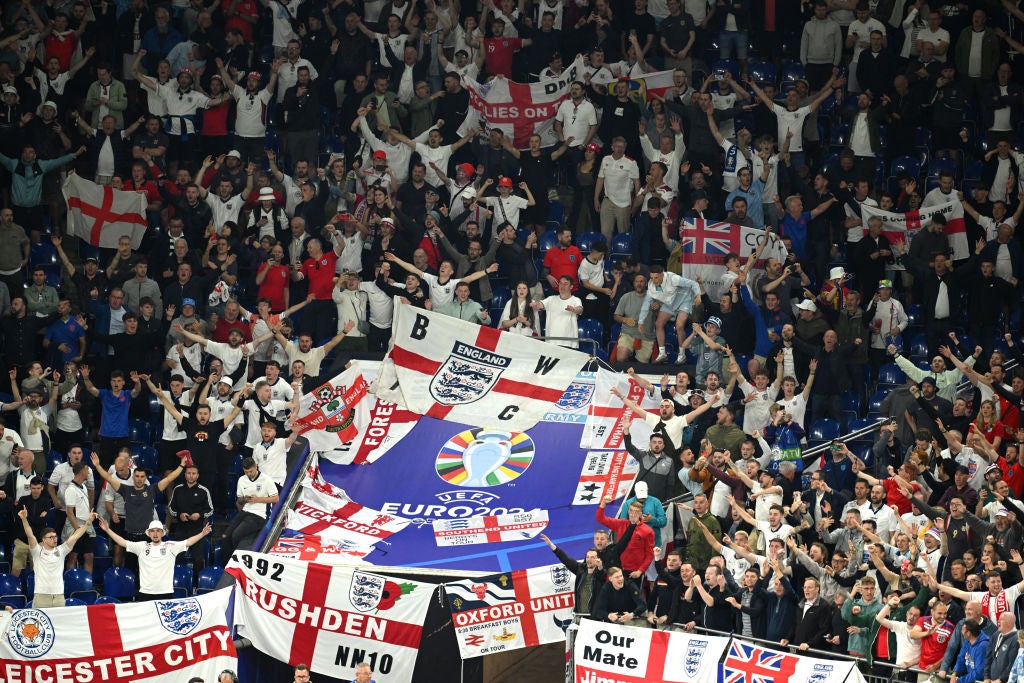German efficiency? Euro 2024 trains are a shambles - and fans are paying the price
England fans experienced long delays and reported dangerous overcrowding as they tried to leave Gelsenkirchen following the 1-0 win over Serbia, with disorganisation an early theme of Euro 2024
More than three hours had passed since England’s narrow and nervy win over Serbia to start their Euro 2024 campaign, but the scene at the Gelsenkirchen Hauptbahnhof was one of chaos. The six-mile journey from the Veltins Arena back into the city’s central station should have taken around 20 minutes by tram, yet many of the England supporters who had left at full-time in hope of an early exit remained in Gelsenkirchen, unable to move, as the packed platform waited on a train that was delayed by an over hour and counting. Up and down the platform, football fans shared the same story of disorganisation and frustration.
Welcome to Euro 2024 in Germany, where nothing is on time and the only guarantee is delays.
On Sunday night, and then into Monday morning, England fans found that out for themselves as the transport system around the Veltins Arena collapsed and left supporters facing more than two-hour queues for the tram away from the stadium. Several supporters reported crushes to The Independent, as a capacity crowd of over 50,000 left at once and found the stadium was only serviced by a two-carriage tram that ran every 15 minutes. Fans were left waiting without information or guidance.
One supporter who is following England at a ninth major international tournament described the lack of organisation in Gelsenkirchen as by far the worst they had seen in 20 years. On a day where football hooliganism returned to the headlines following arrests in the city centre, it was the patience and behaviour of the supporters in the face of dangerous overcrowding that prevented any further incidents. Fans who were at the game described the queues back to the trams at the Veltins Arena as “incredibly unsafe”, while shortages of staff or stewards were also reported.
The issues weren’t just to do with the post-game rush, either. During the day, England supporters had been urged to gather at an allocated fan park in a racecourse and encouraged to soak up the atmosphere there as an alternative to meeting in the city. Yet, with more than three hours to go until kick-off, the queues to get onto the trams to take supporters to the stadium were already an hour and a half long. Fans who were stuck in the long lines then became agitated that they would miss kick-off, as it became clear that there were not enough trams running to safely transport the crowds at the fan park to the game.
Similar stories could be heard across the first three days of Euro 2024. If Germany once had a reputation for an efficient public transport network, the start of the European Championship has revealed its deficiencies On the opening night of the tournament on Friday, as hosts Germany welcomed Scotland and the masses of the Tartan Army, the city’s subway was already creaking more than three hours before kick off: a lack of staff on the platform led to dangerously packed carriages heading to the Allianz Arena in the north of the city, while also creating significant delays.
In Dortmund, following Saturday evening’s match between Italy and Albania, some of the trains that supporters were relied upon to travel onwards after the match were suddenly cancelled without explanation, and as late as 2am. Euro 2024 was sold as a tournament where rail travel would facilitate the experience of hopping from city to city, game to game. After all, the Deutsche Bahn, the state-owned national train operator, is one of the major sponsors of Euro 2024. But the reputation the German rail network once had for its military precision is eroding in front of the visiting masses.

England fans, through the Football Supporters Association (FSA), had also warned Uefa of the potential for problems travelling to and from grounds following an away game in Munich two years ago and did not hear back.
“To see fans stranded in Gelsenkirchen Hauptbahnhof three hours after the game has finished due to transport problems at a major tournament is quite simply ridiculous,” an FSA statement said. “Ahead of the tournament we made it clear to UEFA and the authorities that many, many thousands of England fans would be travelling to Gelsenkirchen from the outer towns and cities in North Rhine-Westphalia and that transport back to Gelsenkirchen Hauptbahnhof from Arena AufSchalke had to be the biggest priority.”
Their recommendations have evidently not been implemented. Uefa, as well, will have questions to answer.
Gelsenkirchen has revealed those issues in a clearer light. A city of just over 250,000 people now appears unsuitable for fixtures of this magnitude. Most travelling fans are required to stay elsewhere in the Ruhr region and travel onwards following the game, but the infrastructure cannot cope. England’s victory against Serbia was one of four to be played in Gelsenkirchen, including Thursday’s heavyweight clash between Spain and Italy and a last-16 tie, which would involve England if they top their group.
And while England fans eventually boarded delayed trains onto nearby Essen, Cologne and Dusseldorf, well over three hours after leaving the Veltins Arena, what football fans had hoped to be a celebration of the first proper men’s international tournament for travelling supporters since Euro 2016 is quickly turning into one of disorganisation and chaos.
Join our commenting forum
Join thought-provoking conversations, follow other Independent readers and see their replies
Comments


Bookmark popover
Removed from bookmarks